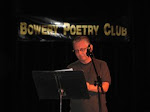The Uproar.
Arrows whirring through the air.
A darker day begins.
An Indian “branch” struggles for air,
and like, as lightning, wildly.
Deeply brewing in the forest and seething,
“HUNGER,” the uproar of the bellies crashes,
it brews in every nook and cranny.
I stood alone in the forest for a long time,
the black clouds pulled home.
Deep in the country a chieftain wept
and the branch in the tree wept bitterly.
[Translated by Gary Sullivan.]
* * *
Der Aufruhr.
Pfeile schwirren durch die Luft.
Ein düsterer Tag beginnt.
Ein Indianer»stamm« ringt nach Luft,
und gleich, wie der Blitz, wild.
Tief im Wald gärt und brodelt es,
»HUNGER«, Aufruhr der Mägen, kracht es,
in allen Ecken und Enden gärt es.
Ich stand im Wald lange allein,
die Schwarzen Wolken zogen heim.
Tief im Land weinte ein Häuptling
und der Stamm im Baum weinte bitterlich.
* * *
Notes
“Stamm” in German can mean “root,” “trunk” or “tribe” or “clan.” “Indianerstamm” means, as you would expect, “Indian tribe.”
Indianer»stamm« is exactly it appears in Herbeck's original, with the quote marks and no space between the Indianer, quote mark, and stamm.
Clearly he is signaling the other meaning of stamm: root, which is how one would read it in the last line of the poem.
I originally translated the first instance of “stamm,” lowercase, as “tribe,” and the second as root. But as it's clear that Herbeck is forcing the connection, I came up with a compromise that I hope isn't itself too forced: “branch.”
Subscribe to:
Post Comments (Atom)

No comments:
Post a Comment